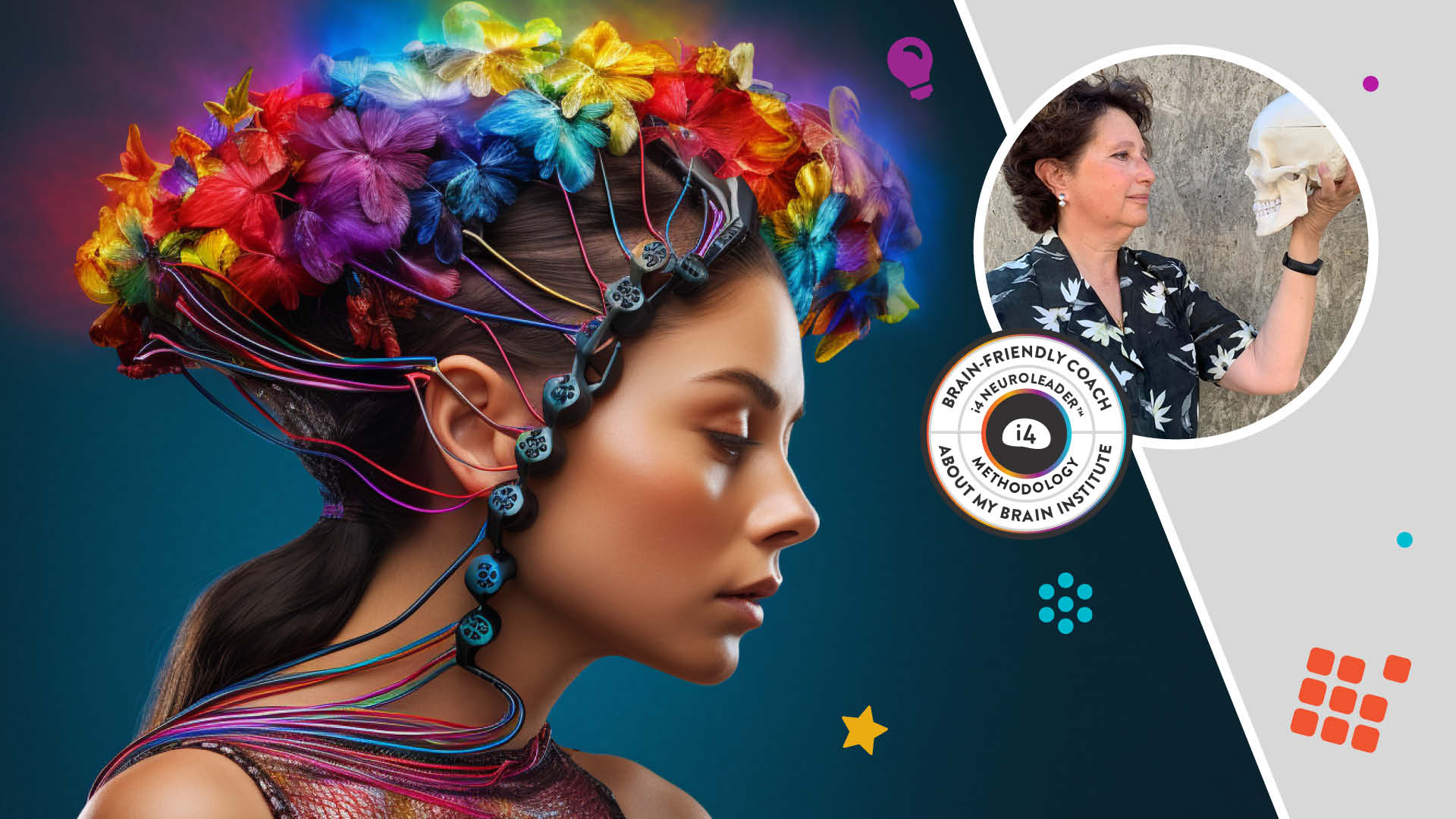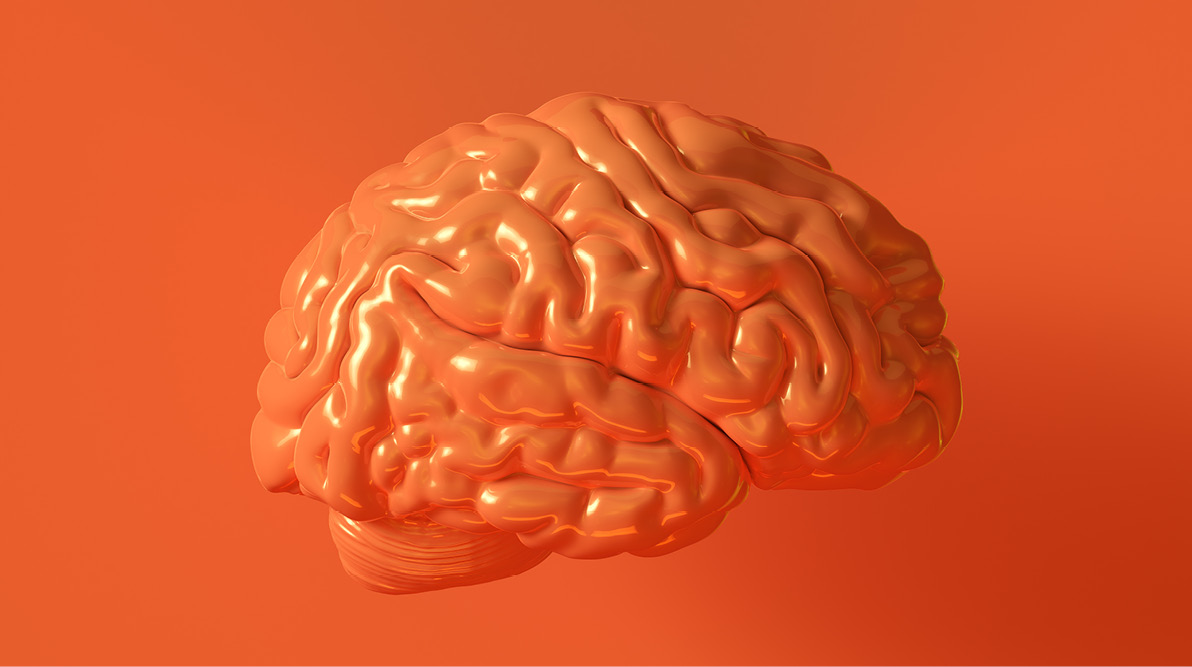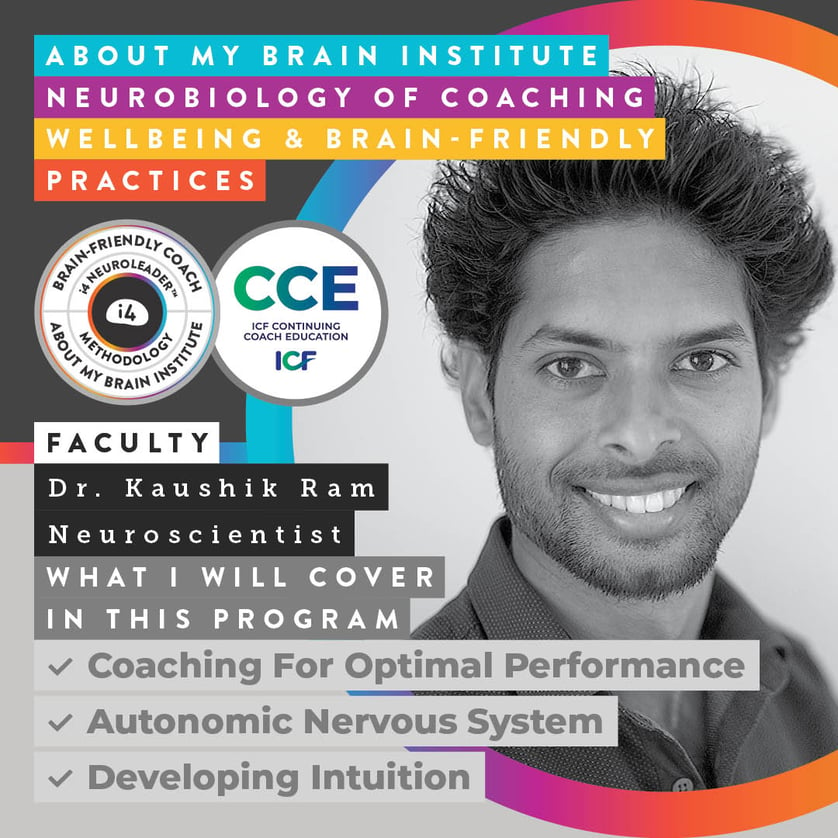The Neurobiology of Performance: Applying Brain-Friendly Practices in Coaching & Wellbeing Training
During a recent chat with Dr Kaushik Ram, we discussed questions coaches and leaders may have before embarking on our programs. Our 2024 edition of the i4 Neuroleader™ Certification, has been upgraded to include lessons on the ‘Neurobiology of Coaching, Well-Being and Brain-Friendly Practices’.
What is a brain-friendly coach?
A brain-friendly coach helps clients become healthier and happier, and our programs provide the tools needed to support the brains and bodies of those you work with.
Please note: The ‘Neurobiology Of Coaching, Well-Being and Brain-Friendly Practices’ program mentioned in the video above, has since been converted into self-paced lessons that make part of our online i4 Neuroleader™ Assessment Certification.
Breaking Down Performance
Performance is a very broad area of research, so to make it easier to understand and process how to improve mental performance, we’ve broken it into four key pillars--mental readiness, balance, integration and ethics.
Mental Readiness
Mental readiness means we are mentally prepared to face a situation or challenge. Our brains are always ‘on’ in our busy world, and distractions are constant. How can we ensure that our brains are ready to perform when a million things are pulling at our attention?
Mental readiness means we are focused, confident, motivated and resilient. Goal setting, visualisation and positive self-talk can help people cultivate a more proactive mindset, enhancing performance and wellbeing while reducing doubt and anxiety.
Why would improving mental readiness be helpful for our clients? Situations that require high levels of concentration and rapid decision-making require a ready and willing brain. Ensuring that we can cope with unexpected events means we are mentally prepared to cope with these challenges effectively.
Read our Mental Readiness articles here.
Balance
Balancing the body and the brain can be tricky but is well worth the effort. We cannot have optimal performance with just the brain or just the body. Rather, they are both required, and we must create a harmonious relationship between them.
Fortunately, there are several methods to help promote balance. Mindfulness is the practice of being present in the moment and paying attention to your thoughts and feelings without judgement. Encouraging a healthy diet, enough sleep and regular exercise also promote balance.
Connecting with others can also promote mental and physical health. Spending time with friends and family, perhaps while walking in nature or playing something fun like pickleball, can help create a more balanced and harmonious relationship between the body and the brain.
Read our Balance articles here.
Integration
Integration refers to the effective functioning of various components of the brain and body that create a healthy biological system. Brain integration is critical regarding coaching and leadership effectiveness and general health and wellbeing.
What is an integrated system like, and how would this benefit our clients? An integrated system is evident in someone who is mostly calm but also alert, responsive, mindful and energetic. Imagine supporting clients not yet experiencing integration and the myriad of positive changes they can look forward to.
The prefrontal cortex, which sits just behind the forehead in our skulls, is involved in decision-making, planning and abstract reasoning. Ensuring this structure is working properly is vital for consistent and effective leadership. The brain is such a powerful tool, so why not learn how to support integration to enhance performance?
So often we lean to performance-enhancers to help us mimic integration. Substances such as caffeine can give us a temporary edge but often leave side effects to be dealt with later. Improving cognitive function can help the brain and body communicate, and we should not rely on chemical means to create a similar effect.
Read our Integration articles here.
Ethics
In today’s online world, ethics seem to be forgotten. Keyboard warriors say hateful things behind anonymous veils, causing damage to individuals and businesses. People may argue that confronting this decline in ethics can stifle progress. However, we can move forward with the right morals and practices in place.
Our personal ethics shape who we are, and addictions can make it easier to bend or break our own rules. Money, greed and power drive many people in positions of power, be they political or in the business world. Learning to stay true to your ethics in such challenging conditions is a hallmark of a neuroleader.
Teaching clients to become more ethical requires a shift in thinking. We must be aware of our addictions and be willing to honestly reflect on how we are doing as a leader, parent, friend or caregiver. When the brain and body work together to form a robust and ethical foundation, our decision-making and resourcefulness will improve.
Read our Ethics articles here.
What Sets our Programs Apart from Other Offerings?
It is easy to talk about performance from a brain perspective. Many programs address mindset and neuroscience, but only a few also take the body into account. Our programs will ensure you have the skills and tools to support yourself or your clients while increasing performance.
Are the i4 Neuroleader™ Certification programs right for me?
The answer is yes if any of the following apply:
- You are a beginner in the coaching realm. Are you just starting and looking to improve your skill set? Unlock the i4 Neuroleader Methodology to improve brain and body function.
- You are more experienced, or even very experienced. We can always enhance our toolbox; even the most experienced coaches can find something new to help optimise their client’s performance.
- You are a consultant, coach or leader. This journey of self-discovery will provide you with ideas and experiences to share with clients and team members while supporting brain-friendly cultures. Knowing how to improve and preserve wellbeing in others is complex and requires a systematic approach.
- You are busy but intrigued. The program is set up to be worker-friendly. Weekly sessions (with breaks scattered throughout) will keep your learning up to speed while providing the time needed for integration.
- You believe that improving performance is possible. You can share so much practical knowledge with your clients about balancing and integrating the mind and body. Likely, these skills will also positively impact your life as well.
Optimising Performance on a Biological Level has Many Positive Impacts
When we optimise performance on a truly biological level, from the brain to all parts of the body, we can expect positive improvements in other areas, including collaboration, innovation and agility. We have an opportunity to awaken abilities we might not regularly use in the workplace, such as imagination and creativity.
We, as a workforce, have never faced circumstances like those of today. Some people are leading people remotely, or people who work at home and the office or people who work onsite all the time. How can we influence and inspire people to help them adapt to this new world?
Learning how to coach from a biological perspective is better than telling people to simply change. People are less receptive to commands, but they are more likely to make changes when they understand how their brain and body can become synchronised for better results.
When people create policies for others without understanding the brain and body and how they interact, they limit performance. People will come together in a state of harmony when their wellbeing is supported. And employees are rightfully starting to expect and demand these working conditions.
Employers may need to learn how to drive employee wellbeing, so this program is aimed at coaches and leaders who want to better understand themselves and how to improve wellbeing. Leaders should be role models for others, so as coaches, we should also model brain-friendly practices to our clients.
A note from our Founder, Silvia Damiano
Dr Ram and I invite you to acquire a neurocoaching mindset and explore how to optimise brain and body function.
Learn more about our certification programs here!
- i4 Neuroleader (353)
- Leadership & Culture (324)
- Brain Health & Wellbeing (202)
- Innovation (97)
- Performance (85)
- Our News (80)
- Collaboration (68)
- Agility (53)
- Practitioner Stories (44)
- In The Press (36)
- Make Me A Leader (33)
- Balance (31)
- Integration (30)
- Imagination (29)
- Awareness (23)
- Brain-Friendly Channel (22)
- Communication (22)
- Curiosity (21)
- Inspiration (19)
- Intuition (19)
- Attitude (17)
- Courage (16)
- Adaptability (14)
- Case Studies (14)
- Drive (14)
- Generosity (13)
- Brain-Friendly Leadership (11)
- Ethics (9)
- Mental Readiness (9)
- Influence (8)
- Retreat (6)
- Brain-Friendly Leadership (1)
- Oracle Cards (1)
- 1 March 2025 (9)
- 1 February 2025 (3)
- 1 September 2024 (4)
- 1 July 2024 (2)
- 1 June 2024 (6)
- 1 May 2024 (2)
- 1 April 2024 (3)
- 1 March 2024 (1)
- 1 November 2023 (1)
- 1 August 2023 (1)
- 1 July 2023 (2)
- 1 June 2023 (2)
- 1 May 2023 (4)
- 1 April 2023 (2)
- 1 March 2023 (7)
- 1 February 2023 (4)
- 1 January 2023 (1)
- 1 September 2022 (1)
- 1 May 2022 (3)
- 1 April 2022 (1)
- 1 March 2022 (5)
- 1 February 2022 (4)
- 1 January 2022 (4)
- 1 December 2021 (2)
- 1 November 2021 (4)
- 1 October 2021 (3)
- 1 September 2021 (6)
- 1 August 2021 (1)
- 1 April 2021 (1)
- 1 December 2020 (2)
- 1 November 2020 (1)
- 1 September 2020 (1)
- 1 August 2020 (1)
- 1 July 2020 (3)
- 1 June 2020 (4)
- 1 May 2020 (3)
- 1 April 2020 (4)
- 1 March 2020 (6)
- 1 February 2020 (4)
- 1 January 2020 (2)
- 1 December 2019 (3)
- 1 November 2019 (3)
- 1 October 2019 (5)
- 1 September 2019 (4)
- 1 August 2019 (4)
- 1 July 2019 (4)
- 1 June 2019 (5)
- 1 May 2019 (9)
- 1 April 2019 (9)
- 1 March 2019 (8)
- 1 February 2019 (7)
- 1 January 2019 (8)
- 1 December 2018 (5)
- 1 November 2018 (10)
- 1 October 2018 (16)
- 1 September 2018 (9)
- 1 August 2018 (10)
- 1 July 2018 (9)
- 1 June 2018 (8)
- 1 May 2018 (9)
- 1 April 2018 (9)
- 1 March 2018 (9)
- 1 February 2018 (8)
- 1 January 2018 (8)
- 1 December 2017 (6)
- 1 November 2017 (9)
- 1 October 2017 (9)
- 1 September 2017 (8)
- 1 August 2017 (10)
- 1 July 2017 (8)
- 1 June 2017 (8)
- 1 May 2017 (9)
- 1 April 2017 (8)
- 1 March 2017 (6)
- 1 January 2017 (3)
- 1 December 2016 (4)
- 1 November 2016 (5)
- 1 October 2016 (4)
- 1 September 2016 (2)
- 1 August 2016 (4)
- 1 July 2016 (4)
- 1 June 2016 (2)
- 1 May 2016 (3)
- 1 April 2016 (3)
- 1 March 2016 (7)
- 1 February 2016 (2)
- 1 January 2016 (5)
- 1 December 2015 (2)
- 1 November 2015 (2)
- 1 October 2015 (4)
- 1 September 2015 (2)
- 1 August 2015 (2)
- 1 July 2015 (1)
- 1 June 2015 (3)
- 1 May 2015 (4)
- 1 April 2015 (5)
- 1 March 2015 (3)
- 1 February 2015 (3)
- 1 January 2015 (3)
- 1 December 2014 (3)
- 1 November 2014 (3)
- 1 October 2014 (3)
- 1 September 2014 (5)
- 1 August 2014 (4)
- 1 July 2014 (5)
- 1 June 2014 (3)
- 1 May 2014 (1)
- 1 March 2014 (1)
- 1 December 2013 (2)
- 1 November 2013 (1)
- 1 July 2013 (1)
- 1 June 2013 (1)
- 1 May 2013 (3)
- 1 April 2013 (1)
- 1 March 2013 (2)
- 1 February 2013 (1)
- 1 January 2013 (2)
- 1 November 2012 (1)
- 1 October 2012 (1)
- 1 September 2012 (1)
- 1 August 2012 (2)
- 1 July 2012 (1)
- 1 June 2012 (1)
- 1 May 2012 (2)
- 1 April 2012 (1)
- 1 February 2012 (1)
- 1 January 2012 (1)
- 1 November 2011 (1)
- 1 October 2011 (3)
- 1 September 2011 (2)
- 1 July 2011 (1)
- 1 June 2011 (1)
- 1 May 2011 (1)
- 1 April 2011 (1)
- 1 March 2011 (1)
- 1 February 2011 (2)
- 1 January 2011 (4)
- 1 December 2010 (4)
- 1 November 2010 (3)
- 1 October 2010 (5)
- 1 September 2010 (4)
- 1 August 2010 (4)
- 1 July 2010 (3)
- 1 June 2010 (4)
- 1 May 2010 (7)
- 1 April 2010 (5)
Subscribe by email
You May Also Like
These Related Stories

Become A Brain-Friendly Coach: Using Brain Health Knowledge In Coaching

Become A ‘Brain-Friendly Coach’ And Change Your Outlook On Life





No Comments Yet
Let us know what you think